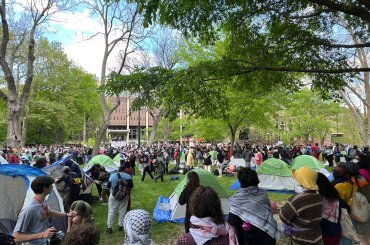Today, students at Fordham University filed a lawsuit against the school over its refusal to grant club status to Students for Justice in Palestine (SJP). Represented by the Center for Constitutional Rights (CCR), cooperating counsel Alan Levine, and Palestine Legal, the students argued that the denial is “viewpoint discrimination” in violation of Fordham’s policies regarding free expression.
“As a Palestinian on campus, I was denied the opportunity to advocate for freedom for my people,” said Ahmad Awad, a graduating Fordham student. “Instead of encouraging our human rights advocacy, the university sided with those trying to silence our voices.”
SJP applied for club status in 2015 and intended to organize educational events on Fordham’s Lincoln Center campus about Palestinian human rights. While the application was pending, administrators expressed concern that SJP’s presence would “stir up controversy,” consulted Jewish faculty and students on whether SJP should be approved, and repeatedly delayed a decision on the application. A year after the application was filed, the student government approved recognition of SJP as a student club. Fordham’s Dean of Students, Keith Eldredge, then took the unprecedented step of overruling that decision and denying the request because, he stated, approving SJP would lead to “polarization,” and that the call for Boycott, Divestment, and Sanctions (BDS) “presents a barrier to open dialogue.”
Numerous civil rights and community groups condemned the decision, including Catholic clergy and professors, and over 100 Fordham professors. Last week, faculty voted no confidence in the leadership of Fordham President Rev. Joseph M. McShane by a margin of 431 to 57.
“If Fordham’s guarantee of freedom of inquiry means anything, it’s that students who want to advocate for Palestinian rights must be able to start an SJP club and host events, invite guest speakers, distribute flyers, and post materials just like any other group,” said Center for Constitutional Rights Deputy Legal Director Maria LaHood. “Even if the expression of views seeking justice in Palestine or demanding respect for human rights through BDS is considered polarizing or offensive to some, it is protected speech; indeed, it is the ideas that challenge us and foster debate that need to be protected most.”
In response to student inquiries, Eldredge informed students there was no appeal of his decision. Shortly after, he charged one of the petitioners in the case filed today, Sapphira Lurie, with violating the school’s “demonstration policy” for protesting the SJP decision and insisted on holding a closed-door hearing on the disciplinary charge, without Lurie having access to counsel or other advisors, and with Eldredge as the sole hearing official and decision maker.
Advocates say Fordham’s treatment of SJP is part of a broader pattern of repression against Palestinian human rights activism, particularly on campuses, which includes administrative disciplinary actions, harassment, firings, baseless legal complaints, and false accusations of terrorism and antisemitism. Palestine Legal responded to 650 such incidents of suppression targeting speech supportive of Palestinian rights from 2014 to 2016.
“Students go to Fordham to exchange ideas and advocate for the disenfranchised, as Jesuit values would presumably encourage,” said Palestine Legal staff attorney Radhika Sainath. “The law is clear: Fordham can’t promise freedom of expression and then take it away when it comes to advocacy for Palestinian rights.”
Read the petition filed today here.
For more information, visit CCR’s and Palestine Legal’s case pages.



If as I suppose Fordham is a private school, then it can probably do very much as it pleases, subject only to state and federal laws and to accreditation groups, but not to the Constitution which governs only public — governmental institutions.
The lawsuit may succeed — we’ll see. But what s/b/d is for a lot of people to BOYCOTT Fordham and all its schools, including its Law School. If Fordham wishes to insist that its students must shout Catholic (or Zionist) teachings at the top of their voices three times a day while standing on their heads, it might be within its rights so to insist, but no-one has to subject himself (pre-modern usage) to such a state of affairs.